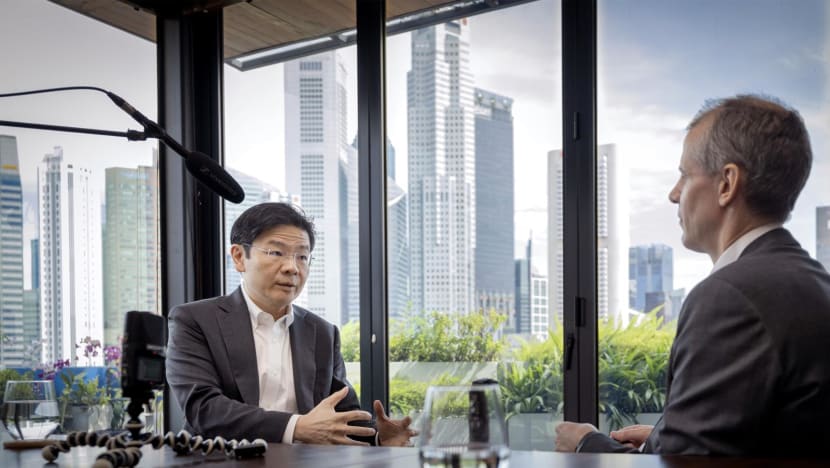PM-to-be Lawrence Wong willing to make 'hard decisions' but will listen to all views: Economist interview
In a wide-ranging interview with The Economist, Mr Wong - who will become Singapore's Prime Minister on May 15 - spoke about his leadership style, the Singaporean-foreigner divide and hot-button issues in the geopolitical sphere.

Singapore Deputy Prime Minister and Minister for Finance Lawrence Wong in an interview with The Economist on May 6, 2024. (Photo: MCI)

This audio is AI-generated.
SINGAPORE: If he has to, Singapore's next leader said he will make unpopular decisions, as long as they are in the best interest of the country and its citizens.
Speaking to The Economist ahead of him officially taking the top job in slightly over a week, current Deputy Prime Minister Lawrence Wong spoke about his leadership style, whether Singaporeans will ever become a minority in their own country and his views on the tense relationship between the world's two biggest economies.
The interview was conducted on Monday (May 6) and the transcript published in full by the British outlet on Wednesday.
THE "IRON" IN HIM
On the issue of leadership, Mr Wong was queried about the "iron" in him, in reference to an oft-quoted line of Singapore's founding Prime Minister.
The Economist asked: "Lee Kuan Yew said whoever governs Singapore must have that iron in him. And there has always been a sense that Singapore's post-independence leaders have been strong men and sometimes even hard men. Do you see yourself as that kind of leader? Do you have iron inside you?"
When "push comes to shove", Mr Wong answered, he would have no issues taking "hard decisions", as long as the decision is in the interest of Singapore and Singaporeans.
Some unpopular decisions he has had to make, he said, included tough measures during the COVID-19 pandemic and the raising of the Goods and Services Tax.
At the same time, he revealed a consultative side to his approach. "I listen carefully to everyone's views. When I go into a meeting, I do not start off assuming that I know all the answers," Mr Wong said.
The upcoming leadership handover would only be Singapore's fourth, with Prime Minister Lee Hsien Loong staying on in the Cabinet as Senior Minister - a move Mr Wong described as a long-standing Singapore tradition.
He told The Economist he does not foresee "any difficulties at all" with this arrangement and said the international networks Mr Lee had built up over the years would come in handy.
"I will use him (Mr Lee) accordingly, in the best possible way because for me, as leader, I will have to find ways to harness the collective energies of all of my team and also every Singaporean, in order to give us the best chances for this little island to keep on shining evermore brightly in a dark and troubled world," said Mr Wong.
US-CHINA RELATIONS
The wide-ranging interview began with Mr Wong's assessment of the international geopolitical scene and unsurprisingly, the issue of US-China relations was brought up.
While there have been signs of some stabilisation to the overall relationship, Mr Wong said, he continues to take a guarded view.
"The underlying contradictions and tensions between the two national positions remain, and I do not see them being bridged anytime soon," Mr Wong said. "It is not a stable equilibrium."
He warned about the collateral damage caused by the bifurcation of technological and economics systems caused by the superpower rivalry.
While the collateral damage was not as obvious as the harms caused in a military sense, using economic and financial tools for geopolitical purposes would have "profound implications to the global economy but worse still, for global stability", said Mr Wong.
SINGAPOREAN-FOREIGNER DIVIDE
On the domestic front, one of Mr Wong's biggest challenges is Singapore's ageing population. He was asked about the thorny issue of migration, as the number of working age Singaporeans drops, as it is expected, in the coming decade.
As an open economy and open society, Singapore welcomes foreign professionals to work here, Mr Wong said. But it will be carefully managed. "Because if it is not controlled, I think we will be easily swamped," he noted.
Asked if there would ever be a point where citizens become a minority, Mr Wong was unequivocal in his answer.
"No, not at all," he said, "We will keep ourselves open, but the flows will be controlled. We will ensure that foreign professionals come in, we welcome them, they add value to our economy, we ask them to adjust to our social norms."
LEGACY
While he has yet to take the hot seat, Mr Wong was asked about what he hoped would be his legacy if he were to serve as Prime Minister for the next decade.
The incoming leader remarked that Singapore has undergone remarkable transformation since achieving independence.
"But the reality is, we are still a very tiny little island in a vast and dangerous world, which is going to get more dangerous in the coming years," he said.
"What has happened in the last 60 years has been nothing short of a miracle. And my mission is to keep this miracle going for as long as I can," said Mr Wong.
"And to make sure our little red dot shines brightly for as long as possible."










